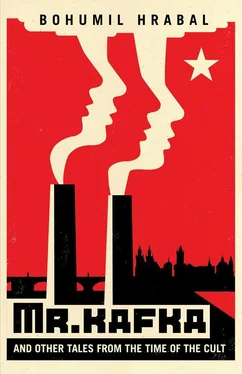“Someone’s going to be in deep trouble,” said the sexton. “Everything just kind of held together. As far as I can see,” he added, putting down his telescope, “all that came off the old man was an eye, the epaulets, and a knee, the same as what’s missing from the statue you’re working on.”
The stonemason leaned out the window and looked down at the gilded cross being gradually hauled upward, suspended in a sling from the Safina National Enterprise crane. He knew that scaffolders’ hands had put up the seven-story structure around the Generalissimo’s statue, that he and other workers had drilled those holes with pneumatic drills at sixteen hundred different points, each marked with a cross, and, as the work had proceeded, that he had personally drilled holes, first in both the Generalissimo’s eyes, and then in a spot in the stone where the Generalissimo’s heart would have been: it felt as if he were drilling a hole into his own heart because he, the stonemason, loved the Generalissimo, had invested his hopes in him, had lived his life through him, and now he’d not only had to participate in the destruction of his enormous monument, but he’d also had to listen to exhortations to wipe the Generalissimo’s picture from his heart, a picture so dear to him he felt he couldn’t go on living without it.
He thought about the other picture that was eating away at him at night, for he now realized that those same scaffolders were today standing on each others’ shoulders like a troupe of acrobats, passing pipes and planks from hand to hand until they’d enveloped the entire Church of the Most Holy Trinity, where he was cementing, to a Catholic statue eroded by weather and time, a new sandstone knee and an eye he’d brought with him in his satchel that morning, along with some salami and a bun. It was all so that, through the restoration of this particular Catholic church, the Church itself could resound once more in its original pomp and splendor.
The summer this year was a hot one. Mr. Valerián and Mr. Mit’ánek felt cooler as soon as they descended into the studio.
“It’s like going to the patent office and claiming I’d invented the bicycle,” said Mr. Valerián, standing in front of the white-plaster statue of the warrior brandishing his plaster-of-Paris stone axe.
“Still,” said Mr. Mit’ánek, “it’s a thing of beauty.”
Mr. Valerián took a swig from the bottle of cheap red wine, then picked up a hatchet and with a single blow lopped off the warrior’s hand, stone axe and all, then he smashed the head and sliced the statue in half at the waist. He stared into the mirrors for a long time, drinking the bitter red wine and talking, throwing up a little at the end of every sentence.
“The mirrors betrayed me,” he said, and he smashed them with his axe, shattering himself, shattering his own image.
“I can see you don’t believe in cheap imitations,” shouted Mr. Mit’ánek. “And you probably don’t believe that as an auxiliary policeman, I can sit down this evening and write all this up, do you?”
Mr. Mit’ánek shook his finger and followed Mr. Valerián around as Mr. Valerián carried the warrior, piece by piece, to the trash bin. The last to go in were the legs, but the lid wouldn’t shut and the warrior’s ankles and feet protruded from the bin. The aunt came around the corner of the alley, carrying soup in an aluminum pot and a casserole tied up in a bundle. “Don’t you think Mr. Valerián might have water on the brain?” she said.
“Oh, shut up, Auntie,” said Mr. Valerián. He went back into the cellar, curling up in a ball on the pile of coal dust, muttering to himself: “Can’t stop now! Must keep going…,” and he began to sob like a little child.
“Working men,” said the stonemason quietly. “It’s all been a terrible con.”
He leaned out the window and looked down into the scrap depot, thinking that if he had any backbone at all, he would jump out of this bell tower as if from a high diving board, taking a good run at it, with his head up so the workers on the scaffolding down below would see that it was deliberate, that it wasn’t an accident, and he’d spread his arms in a swan dive, plummet into the courtyard, and smash himself to pieces on the pile of scrap metal, on the plaques that had marked all those streets and avenues and squares and parks named after the Generalissimo, and if he were lucky, he’d plunge all the way through to the pile of scrap paper and die surrounded by seven hundred kilograms of letters sent by the children of Prague with suggestions about how to make the country an ever more beautiful place.
The summer this year was a hot one. Boys bounced soccer balls off the walls, practicing the Czech Wall Pass.
Breaking Through the Drum
I never felt better than when I was tearing the stubs off people’s tickets and showing them to their seats. In primary school, I loved to make seating plans for the teacher. Then during the war, a weird thing happened to me. A kind of ticket taker’s demon lit on my back and right in the middle of the newsreel, when the voice announced that eighty-eight enemy aircraft had been shot down over Dortmund and only one German plane had gone missing, the perverse little imp whispered something in my ear, and I said in a loud voice: “Aw shucks, it’s bound to turn up again.” My voice sounded like it belonged to somebody else, so I turned up the house lights and ordered the person who’d said it to come forward. The other ushers and I walked through the audience, but no one confessed and so, invoking our official powers, and we actually had such powers, I declared that the entire program, including the feature film, was hereby cancelled, the tickets were null and void and, as punishment, everyone had to go home without a refund.
But I didn’t become an honest-to-goodness ticket taker until later, when I was working the aisles at the Time Cinema. That’s where I got the chance to be a kind of supervisor as well. I didn’t just show people to their seats, I also made sure no one tried to sit through the movie twice. For the first time I was really enjoying myself, and I would feel let down at the end of the shift if I hadn’t been able to grab a patron by the scruff just as he was settling in to watch the movie all over again, in other words, as he was about to defraud the Time Cinema. I’d only have to look at people, and they’d know I was in charge. At intermission, I’d pull the curtains back and open the windows to air the place while the customers who’d seen the complete show were filing out. I’d stand with my arm behind my back, holding the door open for them, while the audience for the next showing was lining up outside, and when the last departing customer had shown his heels I’d open the swinging doors again and tear the first tickets of the new arrivals, at the same time keeping an eagle eye out for anyone still in his seat who’d already seen part of the show, making careful note of when his ticket expired. I also couldn’t stand it when young people talked during the newsreel, because I felt responsible for each showing and I’d lean over and say loudly: “Hush, or they’ll lock us all up!” and my voice was firm enough to command silence; but I still wasn’t persuaded, so I’d stand down by the front row and scan their faces to see if they were really watching the screen or not, and I would usher other patrons to their seats and sometimes ask a whole row to shift over so I could seat a customer precisely where I wanted him to fit my ideal seating plan. I also bought an atomizer with my own money and during intermission I’d spray a solution of aromatic oil into the air. And so I became a bona fide ticket taker for the simple reason that I felt in charge. That was also why I got promoted and became an usher in first-class theatres, concert venues, and public lecture halls.
Читать дальше












